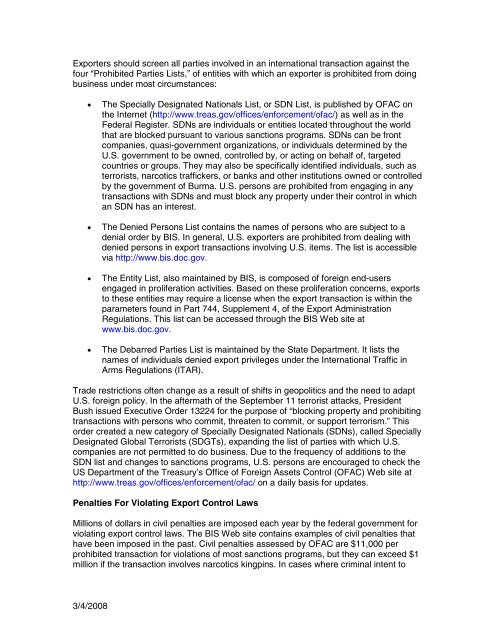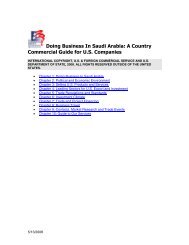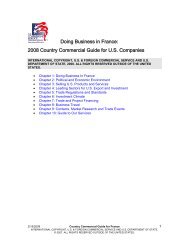Create successful ePaper yourself
Turn your PDF publications into a flip-book with our unique Google optimized e-Paper software.
Exporters should screen all parties involved in an international transaction against the<br />
four “Prohibited Parties Lists,” of entities with which an exporter is prohibited from doing<br />
business under most circumstances:<br />
3/4/2008<br />
The Specially Designated Nationals List, or SDN List, is published by OFAC on<br />
the <strong>In</strong>ternet (http://www.treas.gov/offices/enforcement/ofac/) as well as in the<br />
Federal Register. SDNs are individuals or entities located throughout the world<br />
that are blocked pursuant to various sanctions programs. SDNs can be front<br />
companies, quasi-government organizations, or individuals determined by the<br />
U.S. government to be owned, controlled by, or acting on behalf of, targeted<br />
countries or groups. They may also be specifically identified individuals, such as<br />
terrorists, narcotics traffickers, or banks and other institutions owned or controlled<br />
by the government of Burma. U.S. persons are prohibited from engaging in any<br />
transactions with SDNs and must block any property under their control in which<br />
an SDN has an interest.<br />
The Denied Persons List contains the names of persons who are subject to a<br />
denial order by BIS. <strong>In</strong> general, U.S. exporters are prohibited from dealing with<br />
denied persons in export transactions involving U.S. items. The list is accessible<br />
via http://www.bis.doc.gov.<br />
The Entity List, also maintained by BIS, is composed of foreign end-users<br />
engaged in proliferation activities. Based on these proliferation concerns, exports<br />
to these entities may require a license when the export transaction is within the<br />
parameters found in Part 744, Supplement 4, of the Export Administration<br />
Regulations. This list can be accessed through the BIS Web site at<br />
www.bis.doc.gov.<br />
The Debarred Parties List is maintained by the State Department. It lists the<br />
names of individuals denied export privileges under the <strong>In</strong>ternational Traffic in<br />
Arms Regulations (ITAR).<br />
Trade restrictions often change as a result of shifts in geopolitics and the need to adapt<br />
U.S. foreign policy. <strong>In</strong> the aftermath of the September 11 terrorist attacks, President<br />
Bush issued Executive Order 13224 for the purpose of “blocking property and prohibiting<br />
transactions with persons who commit, threaten to commit, or support terrorism.” This<br />
order created a new category of Specially Designated Nationals (SDNs), called Specially<br />
Designated Global Terrorists (SDGTs), expanding the list of parties with which U.S.<br />
companies are not permitted to do business. Due to the frequency of additions to the<br />
SDN list and changes to sanctions programs, U.S. persons are encouraged to check the<br />
US Department of the Treasury’s Office of Foreign Assets Control (OFAC) Web site at<br />
http://www.treas.gov/offices/enforcement/ofac/ on a daily basis for updates.<br />
Penalties For Violating Export Control Laws<br />
Millions of dollars in civil penalties are imposed each year by the federal government for<br />
violating export control laws. The BIS Web site contains examples of civil penalties that<br />
have been imposed in the past. Civil penalties assessed by OFAC are $11,000 per<br />
prohibited transaction for violations of most sanctions programs, but they can exceed $1<br />
million if the transaction involves narcotics kingpins. <strong>In</strong> cases where criminal intent to












